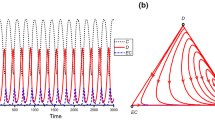Abstract
The conditions that can lead to the exploitative depletion of a shared resource, i.e., the tragedy of the commons, can be reformulated as a game of prisoner’s dilemma: while preserving the common resource is in the best interest of the group, over-consumption is in the interest of each particular individual at any given point in time. One way to try and prevent the tragedy of the commons is through infliction of punishment for over-consumption and/or encouraging under-consumption, thus selecting against over-consumers. Here, the effectiveness of various punishment functions in an evolving consumer-resource system is evaluated within a framework of a parametrically heterogeneous system of ordinary differential equations (ODEs). Conditions leading to the possibility of sustainable coexistence with the common resource for a subset of cases are identified analytically using adaptive dynamics; the effects of punishment on heterogeneous populations with different initial composition are evaluated using the reduction theorem for replicator equations. Obtained results suggest that one cannot prevent the tragedy of the commons through rewarding of under-consumers alone—there must also be an implementation of some degree of punishment that increases in a nonlinear fashion with respect to over-consumption and which may vary depending on the initial distribution of clones in the population.














Similar content being viewed by others
References
Geritz, S. A. H., Kisdi, E., Meszéna, G., & Metz, J. A. J. (1997). Evolutionarily singular strategies and the adaptive growth and branching of the evolutionary tree. Evol. Ecol., 12(1), 35–57.
Gorban, A. N. (1984). Equilibrium encircling. Equations of chemical kinetics and their thermodynamic analysis. Novosibirsk: Nauka.
Gorban, A. N. (2007). Selection theorem for systems with inheritance. Math. Model. Nat. Phenom., 2(4), 1–45.
Hardin, G. (2009). The tragedy of the commons. J. Nat. Resour. Policy Res., 1(3), 243–253.
Hofbauer, J., & Sigmund, K. (2003). Evolutionary game dynamics. Bull. Am. Math. Soc., 40(4), 479.
Karev, G. P. (2010a). On mathematical theory of selection: continuous time population dynamics. J. Math. Biol., 60(1), 107–129.
Karev, G. P. (2010b). Principle of minimum discrimination information and replica dynamics. Entropy, 12(7), 1673–1695.
Kareva, I., Berezovskaya, F., & Castillo-Chavez, C. (2012). Transitional regimes as early warning signals in resource dependent competition models. Math. Biosci.
Krakauer, D. C., Page, K. M., & Erwin, D. H. (2009). Diversity, dilemmas, and monopolies of niche construction. Am. Nat., 173(1), 26–40.
Milinski, M., Semmann, D., & Krambeck, H. J. (2002). Reputation helps solve the tragedy of the commons. Nature, 415(6870), 424–426.
Miller, J. H., & Page, S. E. (2007). Complex adaptive systems: an introduction to computational models of social life. Princeton: Princeton University Press.
Nowak, M. A. (2006). Evolutionary dynamics: exploring the equations of life. Cambridge: Belknap Press.
Ostrom, E. (1990). Governing the commons: the evolution of institutions for collective action. Cambridge: Cambridge University Press.
Page, S. E. (2008). The difference: how the power of diversity creates better groups, firms, schools, and societies (New ed.). Princeton: Princeton University Press.
Page, S. E. (2011). Diversity and complexity. Princeton: Princeton University Press.
Rankin, D. J., & Lopez-Sepulcre, A. (2005). Can adaptation lead to extinction? Oikos, 111(3), 616–619.
Vincent, T. L., & Brown, J. S. (2005). Evolutionary game theory, natural selection, and Darwinian dynamics. Cambridge: Cambridge University Press.
Vollan, B., & Ostrom, E. (2010). Cooperation and the commons. Science, 330(6006), 923–924.
Acknowledgements
The authors would like to thank Kalle Parvinen and John Nagy for their help with adaptive dynamics. This project has been supported by grants from the National Science Foundation (NSF—Grant DMPS-0838705), the National Security Agency (NSA—Grant H98230-09-1-0104), the Alfred P. Sloan Foundation, and the Office of the Provost of Arizona State University. This material is also based upon work partially supported by the National Science Foundation under Grant No. DMS-1135663.
Author information
Authors and Affiliations
Corresponding author
Rights and permissions
About this article
Cite this article
Kareva, I., Morin, B. & Karev, G. Preventing the Tragedy of the Commons Through Punishment of Over-Consumers and Encouragement of Under-Consumers. Bull Math Biol 75, 565–588 (2013). https://doi.org/10.1007/s11538-012-9804-3
Received:
Accepted:
Published:
Issue Date:
DOI: https://doi.org/10.1007/s11538-012-9804-3




